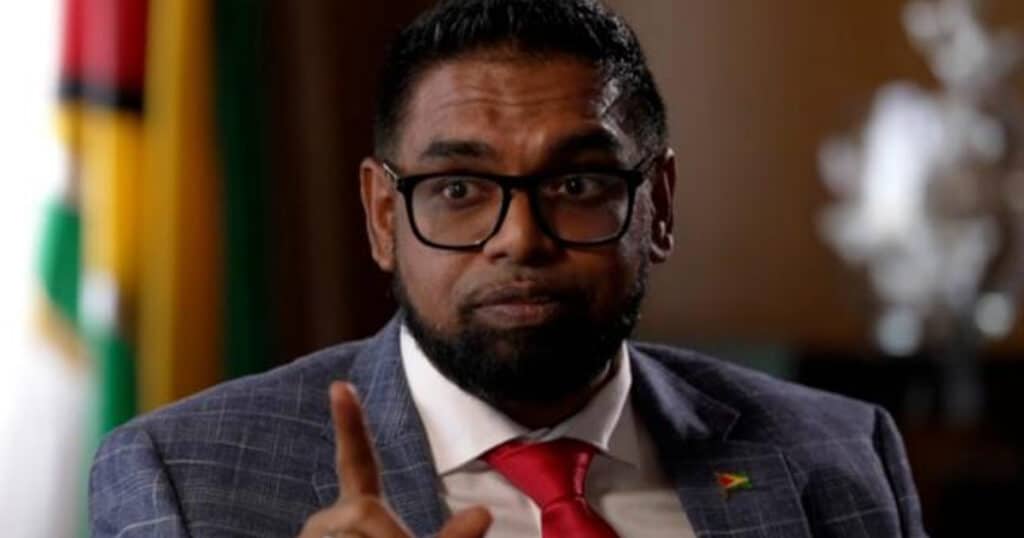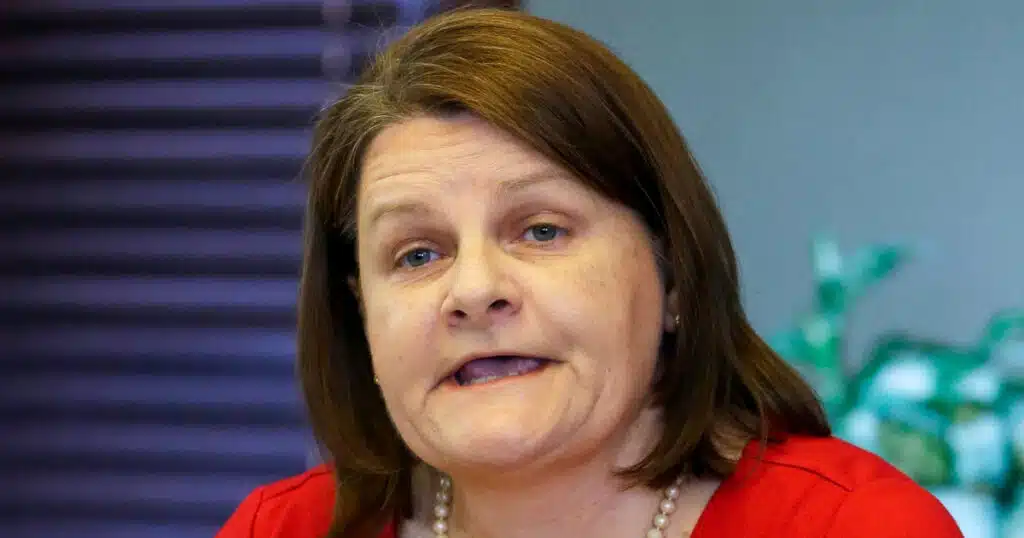
“I Am Going To Lecture You On Climate Change:” BBC Reporter Gets Schooled for Hypocrisy
On March 28, President Mohamed Irfaan Ali of the South American country of Guyana became an instant hero to many as he refused to take lectures on climate change from a BBC reporter during an interview. In a two-minute video clip that went viral on X (formerly Twitter) and other social media, President Ali turned the tables on the BBC’s Stephen Sackur when the reporter accused Guyana of worsening the “climate crisis” by allowing the exploitation of its newly found oil and gas reserves.
“Over the next decade or two, it’s expected that there will be $150 billion worth of oil and gas extracted off your coast,” Sackur told the president. “It’s an extraordinary figure. But think of it in practical terms. That means – according to many experts – two billion tons of carbon emissions will come from your seabed from those reserves and released into the atmosphere.” Guyana’s head of state quickly rebutted: “Let me stop you right there. Did you know that Guyana has a forest that is the size of England and Scotland combined, a forest that stores 19.5 gigatons of carbon, a forest that we have kept alive?”
When the reporter asked President Ali whether the rainforest gave him the “right” to release the carbon, the Guyanese leader retorted: “Does that give you the right to lecture us on climate change? I’m going to lecture you on climate change.” Being lectured by the BBC on climate change is not a new development; it’s what the state-supported media service often does, and in hectoring tones. But is the BBC correct in its proclamations about what the “climate science” says?
Climate Alarmists and Their Detractors
The BBC seems institutionally committed to an alarmist position in its coverage of climate change issues. Many BBC programs seem driven to inject the “climate catastrophe” narrative into every energy-related news item. Stephen Sakur’s pointed remarks to Guyana’s president on the country’s rapid emergence as an oil and gas exporter were unexceptional in this regard.
The response on social media to the viral clip is telling. Here is a short selection from X on March 29 and 30:
Chris Rose (over 130,000 followers): “This is magnificent to watch. The President of Guyana truly put the BBC in its place. When sanctimony and pomposity meets [sic] sense and modesty.”
Simon Ateba (over 670,000 followers): “EXPLOSIVE: President Mohamed Irfaan Ali (@presidentaligy) of Guyana obliterates @BBC journalist Stephen Sackur (@stephensackur) over climate change hypocrisy. ‘No, no, I’m not done yet!’ WATCH.”
Dilly Hussain (over 110,000 followers): “LET ME STOP YOU RIGHT THERE!” An absolute masterclass shutdown by President Mohamed Irfaan Ali of Guyana when probed by @BBCHARDtalk’s Stephen Sackur on his country’s new found oil and gas fields and the West’s concerns about “carbon emissions”.
Visegrád 24 (over 970,000 followers): “I am going to lecture you on climate change,” says Guyana President @presidentaligy to BBC journalist Stephen Sackur, as he pushes back against the journalist attempting to lecture the Caribbean leader about oil being bad for the environment.”
The headlines of leading newspapers on March 30 reflected these social media messages:
The Telegraph: “Watch: Guyana’s president scolds BBC presenter for climate change ‘lecture.’”
Times of India: “‘Are you in their pockets?’: Guyanese President calls out reporter for Western hypocrisy.”
Fox News: “Video of Guyana’s president snapping back at BBC reporter’s climate quiz goes viral: ‘Let me stop you.’”
Hypocrisy As the Default Option in Climate Change Narratives
What is of interest here is the inherently hypocritical nature of the interactions between representatives of developed countries and those of developing ones concerning energy and climate policies. Some of the most apparent of such interactions occur during the UN’s annual COP (“Conference of Parties”) climate summits.
UN Secretary-General António Guterres, never one to shy from hyperbolic pronouncements, warns of a “code red for humanity. The alarm bells are deafening, and the evidence is irrefutable.” Indeed, based on dubious “hockey-stick” global-warming models formulated in the West, the secretary-general proclaims the approach of the “era of global boiling.”
At COP26, held in 2021 in Glasgow, Western leaders addressed those making up 80% of humanity in speeches that reeked of carbon imperialism (here, here, and here). Their message can be fairly summarized as follows:
We pledge climate finance to help you. There are promising new energy technologies to achieve our goals of net zero by 2050. The outlook for new jobs and economic growth are limitless with solar and wind power, electric vehicles, green hydrogen and carbon capture and sequestration. However, we must stop all new fossil fuel investments now! You must give up fossil fuels or else the planet is doomed.
Faced with the increasingly untenable hypocrisy of the Western elites discouraging fossil fuel use in the developing world, the pushback by leaders such as Guyana’s President Ali is no surprise. In 2015, the Indian government’s then-chief economic adviser Arvind Subramaniam spoke in no uncertain terms of a new carbon imperialism: “The rich world’s move against fossil fuels is a disaster for India, and other poorer countries.”
In the lead-up to COP27 held in Sharm Al Sheikh, Egypt in 2022, Africa’s top energy official, Amani Abou-Zeid, the African Union Commissioner for Infrastructure and Energy, said that African countries will push for “a common energy position that sees fossil fuels as necessary to expanding economies and electricity access.”
At the COP28 climate summit held in Dubai, UAE, Dr. Sultan Al Jaber, president of the summit and CEO of Abu Dhabi National Oil Company, rebutted questions from Mary Robinson, a former UN special envoy for climate change: “There is no science out there, or no scenario out there, that says that the phase-out of fossil fuel is what’s going to achieve 1.5 C [maximum global temperature increase].” In an interview, he said that “You’re asking for a phase-out of fossil fuels . . . Please, help me, show me the roadmap for a phase-out of fossil fuel that will allow for sustainable socio-economic development, unless you want to take the world back into caves.”
URL: Cartoons by Josh
That’s Enough Already!
Germany, the world leader in green energy ambitions, provides the best lesson of untenable hypocrisy when faced with the real-world constraints of physics and economics. In 2022, the country faced the prospect of entering winter without adequate energy supplies. It had shut down its nuclear power plants and lost access to piped Russian natural gas by imposing sanctions against Moscow (which was then followed by the sabotage of the Nordstream pipeline). In this context, Germany quickly retreated to coal power generation, and it now plans to double its gas-fired power-generating capacity.
According to Doomberg, an energy and finance consultancy, Germany moved back to coal “with the speed and efficiency of the British evacuation of Dunkirk.” The IEA, the institution most responsible for the West’s clarion calls to stop fossil fuel investments, noted that Germany’s “significant reversal” drove European coal consumption up 9% in 2022. Energy security and the need to heat homes and keep lights on and factories humming trumped virtue-signaling climate goals – and Germany’s abject hypocrisy is obvious to many leaders in the developing world.
Guyana’s President Irfaan Ali has little to explain, much less apologize for, as his country rapidly emerges as an important South American exporter of hydrocarbons. Let the BBC’s reporters peddle their luxury beliefs to those who think they can afford them.
Dr. Tilak K. Doshi is an energy economist, independent consultant, and a Forbes contributor based in London.
This article was originally published by RealClearEnergy and made available via RealClearWire.



